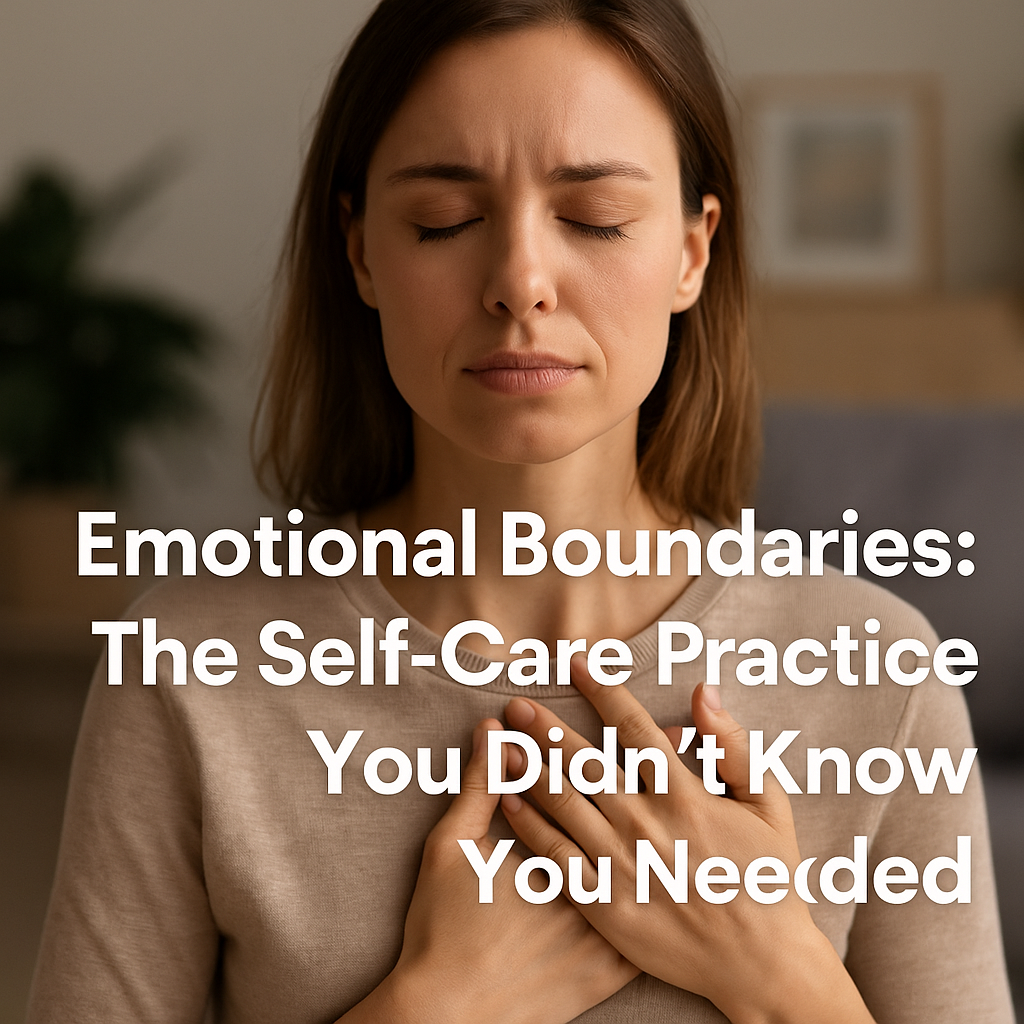In a world that constantly demands our attention, energy, and emotions, protecting our inner peace has become more than just a luxury — it’s a necessity. Emotional boundaries are the invisible lines we draw to protect our mental health, emotional energy, and sense of self. But here’s the thing: most people don’t even realize they need them until it’s too late.
If you’ve ever felt emotionally drained, overly responsible for others, or overwhelmed by constant emotional entanglement, chances are your emotional boundaries need some love and attention.
What Are Emotional Boundaries?
Emotional boundaries are the mental and emotional limits we set in our relationships to safeguard our well-being. They allow us to separate our emotions from those of others and define where our responsibility ends and someone else’s begins.
Setting emotional boundaries doesn’t mean becoming cold or distant — it means recognizing your own needs, emotions, and values, and protecting them with intention.
Why Are Emotional Boundaries a Form of Self-Care?
Self-care is often portrayed as bubble baths, face masks, and spa days. While these are lovely, true self-care also involves the less glamorous but incredibly powerful act of saying “no,” walking away from emotional toxicity, and prioritizing your peace.
Here’s why emotional boundaries are essential to your well-being:
- They prevent burnout. Constantly absorbing others’ emotions can lead to emotional fatigue.
- They improve your relationships. Clear boundaries create healthier dynamics and reduce resentment.
- They boost self-esteem. When you honor your own needs, you reinforce your self-worth.
- They reduce anxiety. Knowing you can say no or step back brings a sense of control.
Signs You Need Stronger Emotional Boundaries
Sometimes we don’t notice that our boundaries are weak until we’re already deep in emotional overload. Here are a few red flags:
- You feel responsible for other people’s feelings.
- You often say yes when you want to say no.
- You absorb others’ moods and emotions.
- You feel guilty when you take time for yourself.
- You fear conflict or rejection if you set limits.
Recognizing these signs is the first step toward reclaiming your emotional space.
How to Begin Setting Emotional Boundaries
Creating boundaries takes courage and practice. It’s not always easy, especially if you’ve been conditioned to prioritize others over yourself. But with consistency, it becomes second nature.
1. Start With Self-Awareness
Pay attention to how you feel in different interactions. Do you feel drained, anxious, or resentful? These emotions are often clues that your boundaries are being crossed.
2. Define Your Limits
Think about what you’re comfortable with emotionally. Where do you draw the line when it comes to what you share, tolerate, or accept? Clarity is key.
3. Communicate Clearly and Kindly
Boundaries don’t have to be harsh. A simple, calm statement like “I’m not comfortable discussing that” or “I need some time to recharge” can be incredibly powerful.
4. Learn to Say No Without Guilt
“No” is a complete sentence. You don’t owe anyone lengthy explanations. Practice saying it with confidence and compassion.
5. Stay Consistent
People might resist at first, especially if they’re used to you always saying yes. Stay firm and remember that your emotional health comes first.
Emotional Boundaries in Different Areas of Life
Boundaries aren’t just for romantic relationships — they apply to family, friends, coworkers, and even social media.
At Work
- Avoid taking on emotional responsibility for coworkers.
- Don’t feel obligated to respond to work emails after hours.
- Set limits on how much personal information you share.
With Family
- Recognize emotional manipulation or guilt-tripping.
- It’s okay to say no to family expectations that don’t serve your well-being.
- Practice detachment with love.
In Romantic Relationships
- Communicate your emotional needs openly.
- Respect each other’s space and individuality.
- Don’t sacrifice your values or identity for love.
Online and Social Media
- Protect your mental space by curating your feed.
- Unfollow accounts that trigger negative emotions.
- Take breaks when needed — your mental health is more important than being constantly “available.”
Healing After Boundary Violations
We’ve all let boundaries slide at some point. What matters is recognizing it and recommitting to yourself. If you’ve been emotionally enmeshed, overextended, or manipulated, healing begins with self-forgiveness and intentional change.
Therapy, journaling, meditation, and surrounding yourself with supportive people can help you restore balance.
Why This Practice Transforms Your Life
Once you begin practicing emotional boundaries, you’ll notice a shift:
- You’ll feel more grounded and less reactive.
- Your relationships will become more respectful and fulfilling.
- You’ll reclaim time and energy for the things that truly matter.
Most importantly, you’ll feel a deeper connection to yourself — and that’s the foundation for everything else.
A New Form of Empowerment
Setting emotional boundaries is one of the most radical forms of self-love. It’s choosing yourself without apology. It’s saying, “I matter.” And it’s something you deserve.
So next time someone tries to cross a line, remember: your peace is not up for negotiation.
